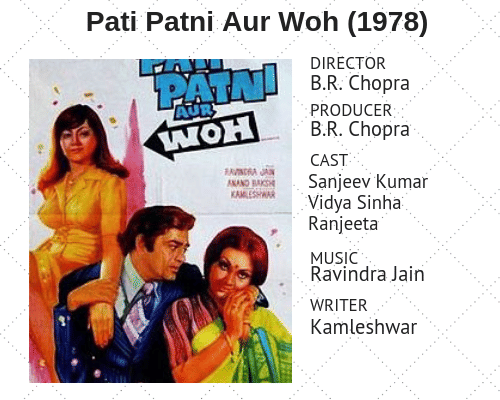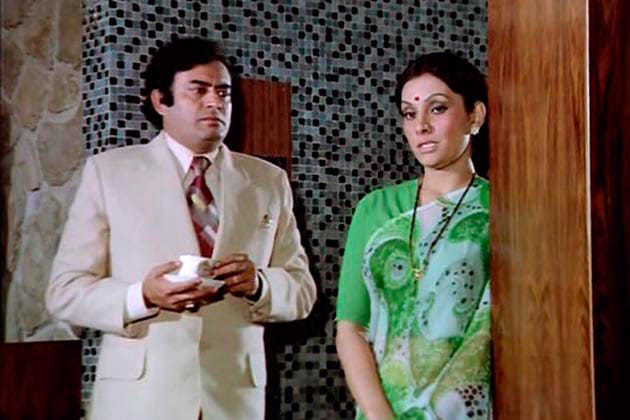The B.R. Chopra film’s overarching philosophy remains ‘men will be men’.
Four decades before the #MeToo movement hit the globe and workplace sexual harassment came up in much-needed discussions, filmmaker B.R. Chopra made a film about workplace liaisons and adultery that serves as a reflection on the values that had popular sanction at that time.

Starring Sanjeev Kumar, Vidya Sinha and Ranjeeta, Pati Patni Aur Woh (1978) showed a middle-aged sales manager having an affair with a younger colleague –the famous secretary syndrome.
The film starts off with an animated sequence and a song about the world’s first couple Adam and Eve, or Aadam or Hawwa here. Aadam and Hawwa transform into Ranjeet (Sanjeev Kumar) and Sharda (Vidya Sinha) as they ‘accidentally’ meet each other. In a quick sequence, featuring another song, the two get married.
It’s a happy marriage but the bliss doesn’t last long. In a cringe-worthy scene, Ranjeet hires a young Nirmala (Ranjeeta) as his personal secretary in what was perhaps the shortest (and outrageous) interview ever conducted. She even takes charge immediately. Apart from his creepy behaviour, Ranjeet also lies to Nirmala saying he has an ‘ailing’ wife. Emotionally manipulating her into a relationship, Ranjeet starts an affair.
In a scene that has since been replicated in a lot of Hindi films, Sharda finds a handkerchief of Ranjeet with lipstick marks on it. When she confronts him, he says he accidentally took someone else’s handkerchief.
Also read: Tarun Tejpal’s gaming of legal system shows why #MeToo doesn’t believe in due process
His affair, full with office romancing and secret dinners, continues unabated till Sharda spots the two at a hotel. Suspicious, she starts following the two and takes pictures for evidence.
Posing as a journalist, she then meets Nirmala who spills the bean on her relationship with Ranjeet.
In what should’ve been the film’s last scene, Sharda and Nirmala confront Ranjeet asking him to explain his actions. Sharda even threatens him with divorce. Through the help of his friend, he manipulates his wife and coaxes her into staying while casting aspersions on Nirmala’s character.
Towards the end, Ranjeet goes back to objectionable antics as he hires a new secretary (Parveen Babi) despite a disastrous extramarital episode.
The music of the film included four songs, one of which became the country’s bathroom anthem — ‘Thande Thande Paani Se Nahana Chahiye’.
https://www.youtube.com/watch?v=d-lVvoHhpfI
The film also featured three cameos by reigning stars of the time – Rishi Kapoor, Neetu Singh and Babi.
Also read: What do you do when your woke friend is named in #MeToo
B.R. Chopra was different from his brother Yash Chopra. He was socially conservative and later made the grating and unwatchable Insaf Ka Tarazu (1980) and Nikaah (1982), and displayed his politics in that last scene with the overarching philosophy being ‘men will be men’.
The success of Pati Patni Aur Woh ‘inspired’ several adultery-themed Hindi films like Hrishikesh Mukherjee’s Rang Birangi (1983) and David Dhawan’s Biwi No 1 (1999). Unfortunately, these also inherited the film’s problematic iteration of ideas around adultery and workplace relationships.







It was a comedy. Get over it.
There are ‘n’ number of examples that depict such behaviour as funny and normal, whether in or out of workplace. ‘Burning Train’ heroes teasing the two women in cycles is just one small example from the Indian film industry that shows such behaviour as cool. ‘Sixteen Candles’ is a gross example from Hollywood.